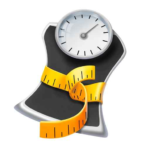Overweight? All Is Not Lost!
 Need to shed 15 or 25 pounds? Try this trick: Pick up a 15- or 25-pound turkey in the grocery store (or a bag of soil at the nursery). Then carry it around for a few minutes. Did you find it tough to do? Extra pounds take a toll, don’t they? But weight gain is often such a gradual process that you might not even realize it’s happening.
Need to shed 15 or 25 pounds? Try this trick: Pick up a 15- or 25-pound turkey in the grocery store (or a bag of soil at the nursery). Then carry it around for a few minutes. Did you find it tough to do? Extra pounds take a toll, don’t they? But weight gain is often such a gradual process that you might not even realize it’s happening.
Sadly, more and more people are dying from weight-related health problems. This includes high blood pressure, cardiovascular disease, cancer, and other conditions. In 2015, 40 percent of 4 million deaths linked to weight were in people who weren’t even considered obese, just overweight. And for those who gain more, the risks are even greater. For example, 44 extra pounds in midlife increases your risk of type 2 diabetes by 10 times. There’s an emotional toll as well. A recent study found that heavy kids faced three times the risk of depression in adulthood.
Okay, enough of the scary statistics. Even small changes can make a big difference. For example, did you know that losing just 7 percent of your body weight can cut your risk of diabetes by 60 percent?
So what can you do? As I’m sure you’re aware, there’s no shortage of weight-loss tips out there. Here are a few backed by recent research:
- Weigh yourself regularly, especially during times of life transition, such as pregnancy or marriage. See the number going up? Nip that trend in the bud before it gets even harder to do.
- Down water instead of other drinks. Following 16,000 adults, researchers found that drinking a glass of water instead of a beer every day reduced the risk of obesity by 20 percent. Substituting water for sugar-sweetened drinks lowered the risk by 15 percent.
- Be wary of artificially sweetened drinks, though. Among 1,000 subjects in seven clinical trials, aspartame, saccharin, and sucralose showed no major weight-loss benefits. In fact, data from 30 observational studies involving 400,000 people showed a link between artificial sweeteners and obesity. These kinds of studies, however, can’t prove a cause-and-effect relationship.
- “Keep on walking, keep on walking,” to paraphrase Dory from Finding Nemo. A global study looked at “activity gaps” and found that waistlines have widened in places where walking rates have declined. The great thing about this activity is that nearly everyone can do it. And it doesn’t cost much, just the price of a good pair of shoes. On your walks, you can also try a few quick bursts of fast walking or running to burn extra calories.
- Get enough sleep. This link might be something you don’t think much about. But studies have shown a lack of sleep may contribute to obesity.
Of course, it goes without saying that you need to focus on healthy food choices, too. Eat more vegetables, fruits, lean meats, fish, and nonfat dairy products. And don’t tempt fate. Keep sugary, starchy foods out of your house, if you can.
If lifestyle changes aren’t quite enough to be effective, your doctor may prescribe a medication or other measures. Ask one of our pharmacists if you have any questions!
Nothing herein constitutes medical advice, diagnosis or treatment, or is a substitute for professional advice. You should always seek the advice of your physician or other medical professional if you have questions or concerns about a medical condition.
